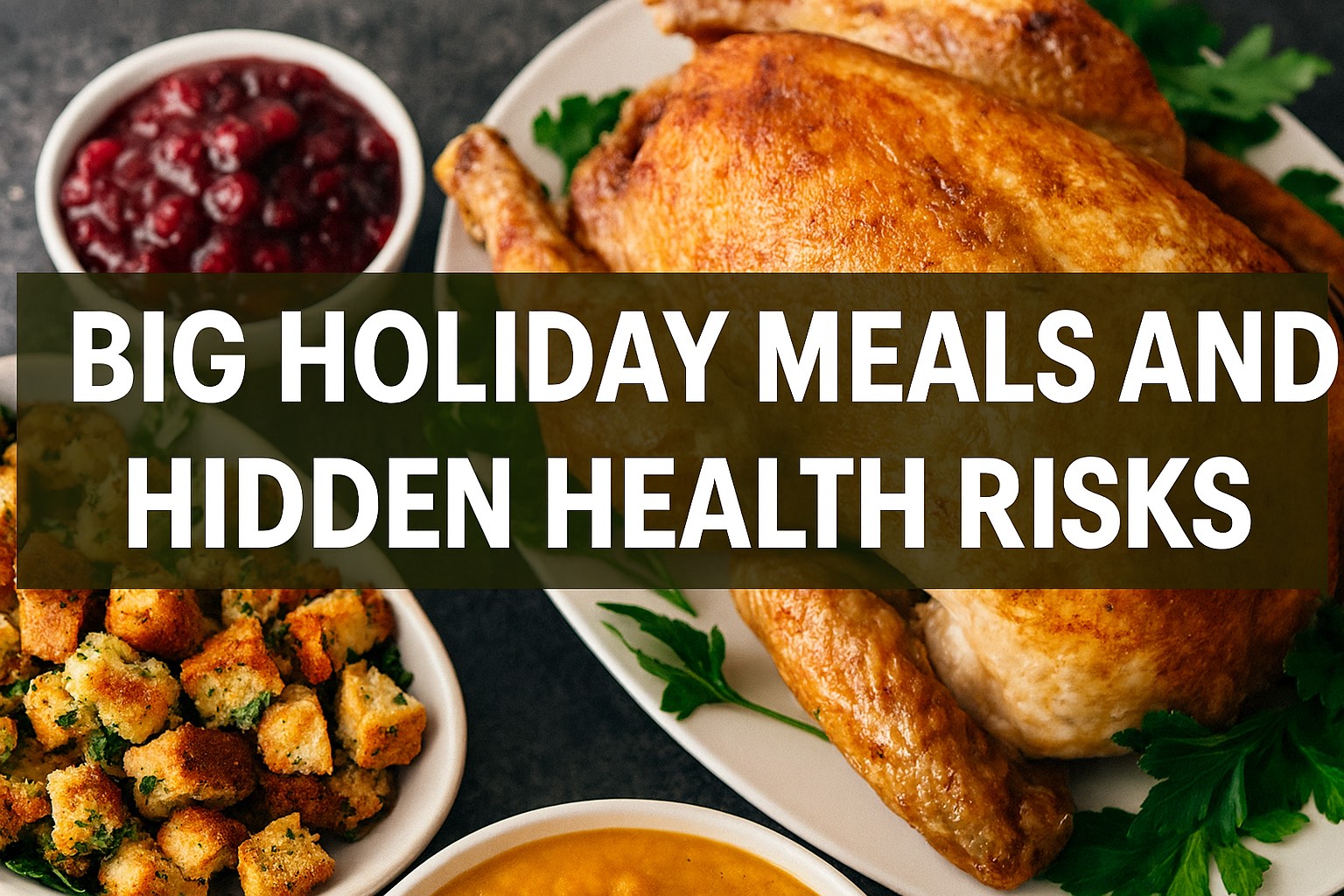Large holiday meals are a cherished tradition, but research shows they can also be dangerous. From cardiovascular emergencies to foodborne illness, the risks of overindulgence are real – and often underestimated.
Heart Attacks Surge During the Holidays
Scientific studies confirm that cardiac deaths increase by 5–15% between Thanksgiving and New Year’s Day. The American Heart Association reports that December 25 is the deadliest day of the year for heart attacks, followed by December 26 and January 1.
- A study of over 53 million deaths found a 4.65% spike in cardiac mortality during Christmas and New Year’s compared to expected seasonal averages.
- Research shows Christmas Eve carries a 37% greater risk of heart attack, with a 20% increase on New Year’s Day.
- A typical Thanksgiving dinner can exceed 5,000 calories, causing triglyceride levels to surge and inflammation that can trigger cardiac events.
Holiday Heart Syndrome, first described in 1978, refers to arrhythmias (especially atrial fibrillation) triggered by binge drinking. It accounts for 35–62% of alcohol-related atrial fibrillation cases in emergency departments.
Why Big Meals Stress the Body
Several physiological mechanisms explain the danger:
- Blood pressure spikes: Sodium-heavy foods cause fluid retention.
- Cholesterol surges: Fat-rich meals elevate triglycerides and LDL cholesterol.
- Postprandial lipemia: After eating, blood thickens with fats, increasing clot risk.
- Insulin stress: Carbohydrate-heavy meals can destabilize blood sugar in diabetics.
Combined with stress, cold weather, and delayed medical care, these factors create a “perfect storm” for cardiovascular emergencies.
Other Health Risks of Holiday Feasting
| Health Risk | Data & Mechanism |
| Heart Attack & Arrhythmia | 5–15% spike in cardiac events; Holiday Heart Syndrome from alcohol |
| Indigestion & Acid Reflux | Large portions slow digestion, raising risk of heartburn and bloating |
| Foodborne Illness | 48 million Americans (1 in 6) sick annually, 3,000 deaths |
| Diabetes Complications | Excess carbs cause hyperglycemia; disrupted routines worsen control |
| Weight Gain | Studies show most adults gain 0.5–1 kg during holidays, often retained |
| Hypertension | Sodium-rich gravies and stuffing elevate blood pressure |
Experiencing Side Effects?
Let’s Rethink Your Meds.
Explore treatment options that may work better for your body – with fewer side effects and lower costs. It’s fast, free, and tailored to you. Learn More →
Food Safety Concerns
Thanksgiving meals pose unique risks for foodborne illness:
- The CDC estimates 48 million illnesses, 53,300 hospitalizations, and 931 deaths annually from foodborne pathogens.
- Turkey is a leading culprit, often contaminated with Salmonella, Campylobacter, and Clostridium perfringens.
- Outbreaks of Clostridium perfringens spike in November and December, often linked to improperly cooled leftovers.
- A USDA study found 97% of people fail to wash hands properly during food preparation, increasing contamination risk.
How to Stay Safe
Evidence-based strategies can reduce risk:
- Portion control: Avoid meals exceeding 3,000–5,000 calories.
- Limit alcohol: Prevent Holiday Heart Syndrome by moderating intake.
- Food safety: Cook turkey to 165°F, refrigerate leftovers within 2 hours, and avoid rinsing raw poultry.
- Stay active: Even a short walk after dinner improves digestion and blood sugar control.
- Recognize symptoms: Chest pain, shortness of breath, or nausea should never be dismissed as “just indigestion.”
The Bottom Line
Holiday meals symbolize joy, but statistics show they also coincide with the deadliest days of the year for heart attacks. Overeating, alcohol, stress, and unsafe food practices combine to create real health hazards. With moderation, vigilance, and safe cooking practices, families can enjoy the holidays without becoming part of these sobering statistics.
Better Treatment, Lower Cost – No Catch.
Find safer, more effective medications with fewer side effects – often for less money. It’s fast, free, and personalized. Learn More →
References (16)
- American Heart Association – Heart attack deaths spike during the winter holidays https://newsroom.heart.org/local-news/heart-attack-deaths-spike-during-the-winter-holidays
- UNC Health Southeastern – Do Heart Attacks Spike During the Holidays? https://www.unchealthsoutheastern.org/about-us/news/2024/do-heart-attacks-spike-during-the-holidays-understanding-the-ris/
- Royal Examiner – Holiday Heart Attacks: Why Cardiac Risks Spike on Christmas and New Year’s https://royalexaminer.com/holiday-heart-attacks-why-cardiac-risks-spike-on-christmas-and-new-years/
- KTVZ / Stacker Science – Why heart attacks spike during Thanksgiving, and what you can do about it https://ktvz.com/stacker-science/2025/11/19/why-heart-attacks-spike-during-thanksgiving-and-what-you-can-do-about-it/
- MedicalXpress – Holiday heart syndrome: What to know before you drink too much this season https://medicalxpress.com/news/2025-11-holiday-heart-syndrome-season.html
- WRIC – Cardiologist urges alcohol moderation to avoid ‘Holiday Heart Syndrome’ this Thanksgiving https://www.wric.com/news/local-news/chesterfield-county/cardiologist-urges-alcohol-moderation-to-avoid-holiday-heart-syndrome-this-thanksgiving/
- Conexiant – Holiday Habits Tied to AF Risks https://conexiant.com/cardiology/articles/holiday-habits-tied-to-af-risks/
- Europe PMC – Holiday Heart Syndrome – StatPearls https://europepmc.org/books/n/statpearls/article-22963/
- Medscape – Holiday Heart Syndrome: Background, Pathophysiology, Epidemiology https://emedicine.medscape.com/article/155050-overview
- CDC – Estimates: Burden of Foodborne Illness in the United States https://www.cdc.gov/food-safety/php/data-research/foodborne-illness-burden/index.html
- Food Safety News – Tips for avoiding foodborne illness with Thanksgiving meals https://www.foodsafetynews.com/2025/11/tips-for-avoiding-foodborne-illness-with-thanksgiving-meals-thawing-your-turkey-can-take-a-few-days/
- NBC Chicago – As Thanksgiving nears, Illinois officials share reminder on preventing foodborne illness https://www.nbcchicago.com/news/local/as-thanksgiving-nears-illinois-officials-share-reminder-on-preventing-foodborne-illness/3855298/
- Katie Couric Media – How to Prevent Food Poisoning on Thanksgiving and Holidays https://katiecouric.com/health/nutrition/how-to-prevent-food-poisoning-when-cooking-thanksgiving/
- NewsNation – How many calories are in the average Thanksgiving dinner? https://www.newsnationnow.com/health/thanksgiving-dinner-food-calories/
- EatThis – Here’s How Many Calories Are in Your Thanksgiving Dinner https://www.eatthis.com/thanksgiving-dinner-calories/
- CalorieHealthy – How Many Calories Are In A Typical Thanksgiving Dinner https://caloriehealthy.com/how-many-calories-does-a-normal-thanksgiving-meal-contain.html


